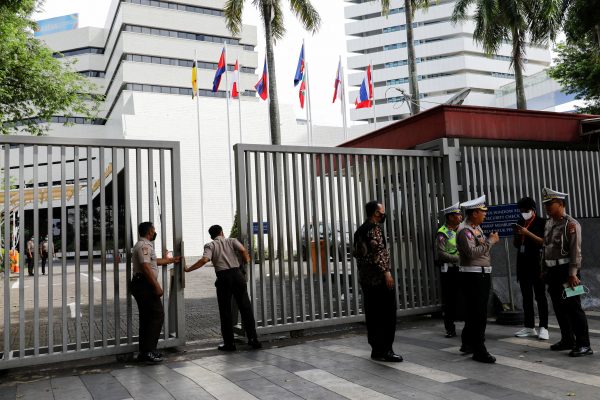In Myanmar, the popular uprising against the 2021 military coup has become a brutal civil war in which no party currently seems to have the upper hand. No area of the country is now untouched by armed conflict: whereas insurgencies were once concentrated in the minority-dominated periphery regions, now the Tatmadaw (military) faces guerrilla warfare from opponents in the Bamar–Buddhist heartland in central and southern Myanmar. Anti-military sentiment in these regions was an ingredient in the National League for Democracy (NLD)’s landslide victory in the November 2020 elections, whose results precipitated the coup and imprisonment of its leader Aung San Suu Kyi in February 2021.
The dynamics of Myanmar’s conflict are complex: there’s not been perfect congruence between the strategies of the new anti-coup militias and the old ethnic armies that have fought the Tatmadaw for decades. Add to this the fact that the military has also mobilised its own pro-regime militias and the picture grows more complicated still.
Nevertheless, as Nicholas Farrelly writes in this week’s lead article, which continues our special series reviewing last year’s events across the Asia Pacific, ‘opposition forces have grown in number, size and sophistication under the umbrella leadership of the National Unity Government’, an umbrella organisation for the political opposition dominated by the NLD but which also includes members of ethnic organisations.
Unable to quash the armed resistance to it, the junta is planning to hold elections in August 2023. ‘The generals aim to convince the Myanmar people and leaders across the Asian region that the best bet is for a managed electoral process, far short of a democratic one, to re-populate the country’s shuttered legislatures with regime-aligned figures and opportunistic ethnic leaders,’ Farrelly writes.
The proposed polls are a potential spanner in the works for the regional response to the conflict. Even a sham election would allow the junta to claim that it has made efforts to restore political normalcy, though likely at the cost of further inflaming the conflict. ASEAN could easily be wedged over whether to acknowledge the elections as a sign of the junta’s willingness to seek a political resolution — let alone over whether to recognise the legitimacy of their results.
As Indonesia takes over as chair of ASEAN in 2023 it is faced with some grave dilemmas about how to proceed. Endi Bayuni of the Jakarta Post says the writing is on the wall for the ‘five-point consensus’ negotiated in the wake of the April 2021 emergency meeting of ASEAN leaders in Jakarta. ‘The Myanmar Plan B should not be about more dialogues or meetings with the junta. That ship has sailed’. Instead, he argues, ‘ASEAN should be prepared to suspend Myanmar’s membership’ now that it ‘has become a liability.’
Yet it would be an extraordinary step for ASEAN to make Myanmar somebody else’s problem, especially given Jakarta’s role in convening ASEAN’s surprisingly strong response to the coup in 2021. Foreign Minister Retno Marsudi is still invested in the five-point consensus, announcing the establishment of a special envoy’s office to lead ASEAN’s continued work on the Myanmar crisis. Indonesia’s commitment to the consensus has been echoed by Malaysia, whose previous government advocated a robust ASEAN response; in his visit to Jakarta last week, newly elected Prime Minister Anwar Ibrahim backed that as the best option for progress.
Then there’s the question of sanctions, a tool with debatable utility in influencing a junta that cares little about Myanmar’s economy but still needs access to weapons and fuel, as well as the cash and legal and logistical loopholes to pay for them.
Sean Turnell, the Australian economic advisor to the former NLD government, observed following his release from political imprisonment that ‘if you’re going to sanction, you go all in. The full Russian variety. That’s the only thing that has a hope of working.’ This is surely true — yet there is no sign of the political commitment across the region to building the kind of sanctions regime that this scenario implies.
Farrelly alludes to the possibility of direct foreign support for the insurgency but concludes that ‘longstanding hesitation about entanglement in a wider war will discourage foreign players from taking more aggressive, interventionist approaches.’ Yet ‘policy calculations could look different’ over the longer term if ‘battlefield momentum swings further behind…anti-coup forces’.
The tragedy is that the one way to end the present carnage is the one thing the junta will probably resist at all costs: simply allowing the government that the Myanmar people elected in 2020 to govern. If ASEAN can’t induce the junta to change its behaviour, impetus for a political solution might emerge from within the country, if the armed resistance keeps the Tatmadaw bogged down.
For ASEAN, it seems, there’s no such thing as a small war.
The EAF Editorial Board is located in the Crawford School of Public Policy, College of Asia and the Pacific, The Australian National University.

